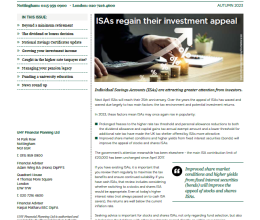A stocks and shares ISA (Individual Savings Account) is a type of tax-efficient investment account. It allows individuals to invest in a wide range of assets, such as stocks, shares, bonds, and funds, without having to pay capital gains tax on the returns generated within the account. Most income from your stocks and shares ISA is also tax-free.
- Stocks and shares ISA provides a wide range of investment options. You can choose individual company stocks, exchange-traded funds (ETFs), mutual funds, government bonds, corporate bonds, and other financial instruments. This diversity allows you to create a diversified investment portfolio based on your risk tolerance and financial goals.
- You have a total tax-efficient allowance of £20,000 for this tax year. This means that the sum of money you invest across all your ISAs this tax year (Cash ISA, Stocks & Shares ISA, Lifetime ISAs, Innovative Finance ISA, or any combination) cannot exceed £20,000.
- You can transfer your existing ISA from one provider to another without losing the tax benefits. Transferred amounts also do not impact this year’s allowance of £20,000. This allows you to take advantage of better investment opportunities or lower fees offered by different ISA providers.
What are the benefits? How do they compare to a typical savings account?
The benefits of a stocks and shares ISA compared to a typical savings account are:
- Higher potential returns - savings accounts can offer low-interest rates, while investments in a stocks and shares ISA have the potential for higher returns over the long term, albeit with higher risks.
- Tax efficiency - capital gains generated within an ISA are exempt from tax. Most income from your stocks and shares ISA is also tax-free. This can significantly enhance the overall returns on your investments compared to investing outside of an ISA, especially if you are a higher-rate taxpayer or have substantial investment gains.
- Diversification - ISAs provide access to a wide range of investment opportunities, which enables you to diversify your portfolio and spread risks.
- You can sell the assets held in your ISA at any time and there’s usually no minimum length of time you need to hold it.
How to go about setting one up, and what's a good amount to put away every month for good returns?
Setting up a stocks and shares ISA:
- Different ISA providers to find one that offers the investment options and services you need. Charges might vary for the same product depending on where you buy it.
- You can apply for a stocks and shares ISA online or through a paper application, depending on the provider's options.
- Once your ISA is set up, you can choose the investments you want to hold within the account. Consider your risk tolerance, investment goals, and time horizon when making these choices.
- Determine an affordable amount to contribute each month based on your financial situation and goals. Regular contributions can help with pound-cost averaging, where you buy more units when prices are low and fewer when prices are high, potentially reducing the impact of short-term market volatility.
What are the risks to be aware of? What should people watch out for?
Risks and considerations:
- Investments in stocks and shares are subject to market fluctuations, and the value of your portfolio can go up or down. There is no guarantee that you will make a profit.
- While diversification can reduce risk, it does not eliminate it entirely. Some investments may still perform poorly, affecting your overall portfolio.
- Investing in the stock market should generally be considered a longer-term endeavour. Short-term fluctuations can be significant, and selling during market downturns could lead to losses.
- Consider your risk tolerance carefully. If you are uncomfortable with the possibility of losing some of your investment, a stocks and shares ISA might not be the best option for you.
- Don't solely rely on past performance as an indicator of future results. Investments can be volatile, and historical returns are not guaranteed to repeat.
A stocks and shares ISA can offer the potential for higher returns compared to a typical savings account, thanks to its tax efficiency and diverse investment options. However, it comes with market risks and requires careful consideration of your financial goals and risk tolerance. Before making any investment decisions, it's advisable to consult with a qualified financial adviser who can provide personalised advice based on your individual circumstances.
The next step
For more information, please contact Andrew Lloyd-Owen on a.lloyd-owen@uhy-manchester.com, or your usual UHY adviser.




